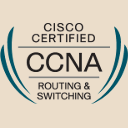In this article:
The five Ws
-
What: CCNA Routing & Switching is a technical certification about enterprise-grade IT networking from Cisco. It covers the involved devices, protocols and how to implement them using Cisco technologies.
-
When: This is an entry-level certification with no prerequisite.
-
Why: This certification demonstrate a good level of familiarity with enterprise networks and Cisco’s IOS-based devices.
It is a de-facto standard in terms of IT networking certification, valuable even for employers using different technologies than Cisco, and is also a prerequisite for several other Cisco certifications.
Note
Note that Cisco certifications may not have the actual CCNA R&S certification as a prerequisite, but the CCENT instead which is half of the CCNA R&S.
If you are interested in networking (and I expect you are when you intend to pass a Cisco exam) I warmly encourage you to pass the full CCNA R&S certification instead of limiting yourself to the CCENT as IMHO the latter really feels like a truncated version of the CCNA R&S and makes you miss a lot of interesting areas.
-
Who: This certification is suitable for anyone willing to learn more about enterprise-grade networking.
While the implementation part obviously relies on Cisco devices, the core of this certification focuses on general knowledge on enterprise-grade networks, in particular their architecture and various protocols involved at each layer.
-
Where: The exam can be taken in any Pearson VUE test center. It is a mix of MCQs and tasks to accomplish in a virtual lab.
You can get this certification through either one or two exams, depending on your preference (personally I took the single-exam route, but the two exams route is also equally valid).
Training material
Building a lab
Building your own lab is a major part of the CCNA learning-path, be it a virtual or physical lab.
-
If you plan to work as a network engineer, I highly advise you to buy real physical Cisco hardware.
The CCNA certification doesn’t require a lot of components and doesn’t require last-generation devices. Paul Browning, author of Cisco CCNA in 60 days (see below) made a very good video on how to build your home lab.
-
On my side, as a security guy I specifically wanted to more focus on the virtualization-side. This was not an attempt to avoid using real gear as it would have certainly be a fun experience (and maybe easier than hunting down for firmware images and virtualization issues) but we all have to manage our available time and to focus on the practical knowledge which will be most beneficial for us down the road. In my case, being to able to build virtual network allowing to reproduce vulnerabilities and attack techniques seemed more relevant.
Being also a free-software guy, I did not went the Cisco VIRL route either but instead learned the ins and out of GNS3. You will find all my notes on this subject in the virtualization section.
Building a lab should mean something for you. As I said in my general post on professional certification, the whole process will require a lot of time and effort, you must do this not for a certification or for an employer, you must primarily do this for yourself.
As Keith Barker summarizes it well in a very interesting video: Find your Passion.
Learning resources
-
subnetting.net:
 Get your training from this website!
At $5 per month, I don’t think you can get cheaper and for the price you
get very well-made videos, well-thoughts hands-on exercises, study sheets,
practice questions and the whole gets regularly updated to follow Cisco’s
requirement evolution.
Get your training from this website!
At $5 per month, I don’t think you can get cheaper and for the price you
get very well-made videos, well-thoughts hands-on exercises, study sheets,
practice questions and the whole gets regularly updated to follow Cisco’s
requirement evolution.The whole thing is very well organized, with a logical progression, and ensures a proper coverage of the knowledge required both to allow you to pass the exam but also to prepare you to the real life.
Kevin and Trey really made an awesome job with this website, you seriously can’t get wrong with them!
-
Sybex CCNA Routing and Switching - Study Guide by Todd Lammle: This book is very massive, more than a thousand of pages, I did not even attempt to read it from cover to cover. However, this books really shines as a secondary source for your studies (and later) as a reference book, to get things explained a different way, find different examples, etc.
While I highly recommend this book as a secondary source of information, I would not recommend it as your main or only source. The thousand pages of this book follow a thematic organization, which is really great to quickly search and find some information, but awful if you need to learn it from cover to cover and must still remember very accurately the protocol your learned 800 pages ago and did not used since then.
-
Cisco CCNA in 60 days by Paul Browning et al.: This book focuses on hand-on exercises with a good dose of motivational discourses and a structured daily planning spread over 60 days to take your hand and allow you to successfully pass the exam.
The originality of this book is indeed this 60 days planning, where each day matches a chapter with its daily lesson and dose of practical exercises.
The first part of the book, where the foundations are being laid, is very demanding while the rest of book, simply adding new concepts on top of the building in an incremental way, are far more easier. I therefore highly recommend to start this book during a vacation period, where you can easily dedicate enough of your time to get your foundations right, then you will find easier it to mix your CCNA studies with you daily activity.
Personally I have no problem in organizing my studies my own way and prefer to do so. I enjoyed the first part and learned the IOS shell with this book, but later-on it became merely a secondary study book. But even as a secondary source of information this book remains great: it’s table-of-content allows to directly find the days covering certain notions and the courses are always to-the-point and highly practical.
Moreover, the author provides a very interesting PDF about the mindset to develop while working for certification (whether it is this one or any other one). It is indeed the Paul’s point-of-view that a lot of people fail not because of technical knowledge, but because of improper mindset, and he does a more thorough job in this area than any other author on the subject. This alone could be a sufficient reason to buy this book.
Warning
Cisco regularly updates its exams, requiring training books to be updated.
Don’t blindly buy the books linked here: they are the latest edition available while I write this article but may be outdated when you read it.
Always check the exact identifier of the exam you want to take and ensure that the book you choose matches it.
Exam simulation
The CCNA exam is a widely known exam:
-
Each of the above mentioned learning sources already come with a good pile of questions to practice before taking the exam. These questions are good quality and usually provide an explanation about the right answer.
-
In case this is not enough for you, you can also search the web for supplementary questions. Beware however that the quality of the questions freely available on the Internet may vary a lot, sometimes what is given as the right answer isn’t even the correct one!
Moreover, I also send you back to the explanation on my general post about professional certification on why you should stay away from websites offering “brain dumps” or “real exam questions”. There is enough legal learning material for the CCNA R&S certification to not enter in such grey area.
-
At last, to get familiar with the exam GUI and various types of questions you will be asked, Cisco provides a free online exam tutorial (this requires Flash Player). Note that a significant part of the Cisco exam goes beyond classical multiple choices questions and rely on a graphical interface specific to Cisco exams.
You will have the same kind of tutorial on the exam day, right before starting the test. I recommend you however to familiarize yourself with the GUI before taking the exam as, if you’re like me, you may want to take advantage of this upfront time to fill your whiteboard with subnetting tables1.
Personal impressions
Curriculum
The CCNA exam does a great job in learning about enterprise-grade networks, no wonder it imposed itself as a de-facto standard on the subject.
If you aren’t following a golden spoon-fed thousands dollars training path, you will have to build your own lab. While this may seem a daunting task (it is hard to choose and install devices you don’t know yet), it is very educating.
The balance between Cisco-proprietary and common standard information, at least in the sources I mentioned above, is well preserved making this certification useful to have a better understanding of both Cisco technologies and of common standard surrounding such networks.
The CCNP-level certifications, the logical sequel of the CCNAs, seem far more focused on Cisco technologies. You may therefore be interested in taking only the CCNA first, and potentially progress toward the CCNP only if you find yourself hired at a position dealing with Cisco devices on a regular basis. Otherwise the CCNA R&S is valuable certification by itself.
For those who take the two exam route, on the contrary I don’t consider the CCENT to be a valuable certification by itself. It just feels like a truncated CCNA R&S and has no real professional benefits, except serving as a prerequisite for some other Cisco certifications or for students as proof of good-will before getting their first job.
Exam
The questions themselves are good: they are clear and non-ambiguous. They globally follow the certification curriculum, but Cisco expects the student to have done its own research and practical studies allowing him to answer more general questions outside of the curriculum.
This is stated explicitly in the CCNA exam description:
The following topics are general guidelines for the content likely to be included on the exam. However, other related topics may also appear on any specific delivery of the exam.
From my personal experience however they do not abuse of this, as I said the questions were good.
The only hindrance were several formatting issues in the questions, typically broken XML tags randomly leaking in the question and answer captions making in few rare occasions answering more a guess than anything else (this exam was the only one for which I found myself regularly using the Comment button to notify Cisco teams about these issues).
This affected about a dozen of questions with one where the answers were barely readable, enough to make their exam feel cheap and dirty: Cisco really should try to improve this.
Conclusion
This is a very good certification. I warmly recommend it to anyone wanting to take the step from home LAN knowledge to corporate LAN.
-
The memory of me frantically filling the whiteboard with lines, numbers and calculus even before the first question was asked seems odd even now, but this is clearly the way to go to start the examination serenely :). ↩
